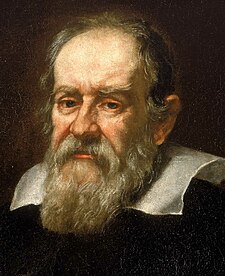Galileo Galilei
| Galileo Galilei | |
|---|---|
 Portrait of Galileo Galilei by Giusto Sustermans | |
| Ìbí | 15 Oṣù Kejì 1564[1] Pisa,[1] Duchy of Florence, Italy |
| Aláìsí | 8 January 1642 (ọmọ ọdún 77)[1] Arcetri,[1] Grand Duchy of Tuscany, Italy |
| Ibùgbé | Grand Duchy of Tuscany, Italy |
| Ọmọ orílẹ̀-èdè | Italian |
| Pápá | Astronomy, Physics and Mathematics |
| Ilé-ẹ̀kọ́ | University of Pisa University of Padua |
| Ibi ẹ̀kọ́ | University of Pisa |
| Academic advisors | Ostilio Ricci[2] |
| Notable students | Benedetto Castelli Mario Guiducci Vincenzio Viviani[3] |
| Ó gbajúmọ̀ fún | Kinematics Dynamics Telescopic observational astronomy Heliocentrism |
| Religious stance | Roman Catholic |
| Signature | |
Notes His father was the musician Vincenzo Galilei. His mistress was Marina Gamba and Maria Celeste was one of Galileo's daughters. | |

Galileo Galilei (Àdàkọ:IPA-it; 15 February 1564[4] – 8 January 1642)[1][5] je ara Italia onimo fisiiki, mathematiiki, olutorawo, ati onimo oye to ko ipa pataki ninu Ijidide Sayensi. Die ninu awon aseyori re ni atunse si teliskopu ati awon akiyesi irawo to se, ati itileyin ise Copernicus. Won ti pe Galileo ni "baba itorawo oniakiyesi odeoni,"[6] "baba fisiiki odeoni,"[7] the "baba sayensi,"[7] ati "Baba Sayensi Odeoni."[8] Stephen Hawking so pe, "Galileo, ju elomiran, lo sise fun ibi sayensi odeoni."[9]

|
Àyọkà yìí tàbí apá rẹ̀ únfẹ́ àtúnṣe sí. Ẹ le fẹ̀ jù báyìí lọ tàbí kí ẹ ṣàtúnṣe rẹ̀ lọ́nà tí yíò mu kúnrẹ́rẹ́. Ẹ ran Wikipedia lọ́wọ́ láti fẹ̀ẹ́ jù báyìí lọ. |
Àwọn Ìtọ́kasí
- ↑ 1.0 1.1 1.2 1.3 1.4 O'Connor, J. J. "Galileo Galilei". The MacTutor History of Mathematics archive. University of St Andrews, Scotland. Retrieved 2007-07-24. Unknown parameter
|coauthors=ignored (|author=suggested) (help) - ↑ F. Vinci, Ostilio Ricci da Fermo, Maestro di Galileo Galilei, Fermo, 1929.
- ↑ http://genealogy.math.ndsu.nodak.edu.id.php?id=134975[Ìjápọ̀ tí kò ṣiṣẹ́ mọ́]
- ↑ Drake (1978, p.1). The date of Galileo's birth is given according to the Julian calendar, which was then in force throughout the whole of Christendom. In 1582 it was replaced in Italy and several other Catholic countries with the Gregorian calendar. Unless otherwise indicated, dates in this article are given according to the Gregorian calendar.
- ↑ Àdàkọ:Ws by John Gerard. Retrieved 11 August 2007
- ↑ Singer, Charles (1941), A Short History of Science to the Nineteenth Century, Clarendon Press (page 217)
- ↑ 7.0 7.1 Weidhorn, Manfred (2005). The Person of the Millennium: The Unique Impact of Galileo on World History. iUniverse. pp. 155. ISBN 0-595-36877-8.
- ↑ Finocchiaro (2007).
- ↑ "Galileo and the Birth of Modern Science, by Stephen Hawking, American Heritage's Invention & Technology, Spring 2009, Vol. 24, No. 1, p. 36